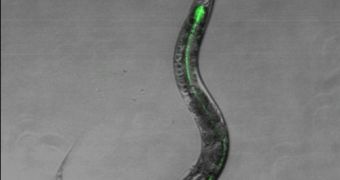British researchers from the University of Birmingham recently managed an astounding genetic breakthrough. They were able to identify the gene that controls the average lifespan of the laboratory worm Caenorhabditis elegans (C. elegans). In addition to this, the gene also appears to bear a significant influence on the creature's aging process. The team says that the gene is found in a wide number of animals, including humans, and that transposing the research in people could result in new methods of altering traits related to aging, immunity and resistance.
In the new work, which was sponsored with grant money from the Biotechnology and Biological Sciences Research Council (BBSRC), it was discovered that the DAF-16 gene had the same effects in the close evolutionary relatives of C. elegans, which again raises hopes that the findings could be used in human studies as well. Details of the breakthrough study appear in the April 1 issue of the Public Library of Science's open-access scientific journal PLoS ONE.
“Aging is a process that all organisms experience, but at very different rates. We know that, even between closely related species, average lifespans can vary enormously. We wanted to find out how normal aging is being governed by genes and what effect these genes have on other traits, such as immunity. To do that, we looked at a gene that we already knew to be involved in the aging process, called DAF-16, to see how it may determine the different rates of aging in different species,” explains the leader of the work, UB professor Dr Robin May. Four related worm species were targeted for the new experiments.
“DAF-16 is part of a group of genes that drive the biological processes involved in aging, immunity and responses to physical or environmental stresses. The fact that subtle differences in DAF-16 between species seem to have such an impact on aging and health is very interesting and may explain how differences in lifespan and related traits have arisen during evolution,” May continues.
“Research using model organisms that uncovers the biology underpinning aging gives us the opportunity to understand some of the mechanisms that determine how humans age in a healthy, or at least normal, way. It is very important to develop a good understanding of healthy aging if we are to appreciate what happens to an older person's physiology when they become unwell or experience difficulties with everyday tasks such as recalling memories or moving around. Improving the health span to mirror increases in the lifespan is an important subject of BBSRC research,” adds UB professor Douglas Kell.

 14 DAY TRIAL //
14 DAY TRIAL //